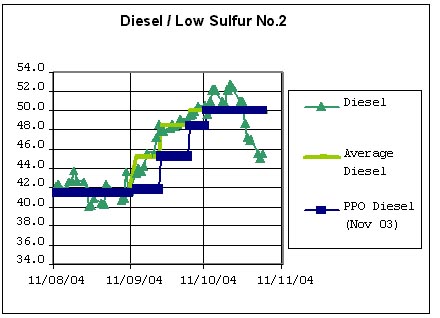|
The following is being distributed at the request of the Petroleum Pricing Office: Interruption formula used to decrease diesel prices On November 7, one day following an intervention in home heating fuel and gasoline prices in Newfoundland and Labrador, the Board of Commissioners of Public Utilities Petroleum Pricing Office (PPO) used its interruption formula � this time, to reduce maximum diesel prices. Fuel prices on the New York Mercantile Exchange (NYMEX) have experienced elevated levels in recent months for a myriad of reasons ranging from geopolitical events to concerns over whether the available fuel supply on the market will meet anticipated demands. This past week, prices for crude oil and refined petroleum products took a downward turn that was sufficient to allow for a slight decrease in diesel prices. Effective 12:01 a.m. Sunday, November 7, 2004, maximum diesel prices declined by 0.4 cents per litre (cpl). The criteria have not been met for residential propane and there will be no price change for this fuel. Furthermore, there will be no more pricing interruptions before November 15. David Toms, PPO director (acting), explained that diesel (though a separately-traded commodity) behaves similarly to home heating fuel on the market because they are both part of the distillate family of fuels, with diesel containing less sulphur. This is why it shouldn� t be surprising that a price change was necessary shortly after one was made for home heating fuel. He noted there has been added pressure placed on diesel, and this explains why diesel prices currently exceed regular (self-serve and full-serve) unleaded and mid-grade (self-serve) gasoline in this province. "This is not only occurring in Newfoundland and Labrador, but elsewhere as well," said Mr. Toms. "There has been a growth in the demand for distillates that was creating a tight market for diesel and home heating fuels. The distillate inventories are lower than last year in advance of the home heating season, and when the demand for home heating fuel increases, it also places added pressure on diesel." Diesel and gasoline fuels have behaved differently in recent months on both the demand and supply fronts, which explains the gap between prices. Demand for diesel has increased during a time when distillate fuel supplies have fallen, and gasoline stocks have increased to a comfortable range following the end of the typical peak demand season; yet, both products have been directly affected by the high costs of crude oil. MARKET BEHAVIOUR The decline in diesel prices and subsequent interruption in the Newfoundland and Labrador market have occurred for many of the same reasons that affected home heating fuel and gasoline November 6:
BACKGROUNDER The PPO uses its interruption formula whenever market prices for regulated fuels meet a certain criteria, provided making the early adjustment doesn�t interfere with the regular pricing schedule. For the interruption formula to be used on gasoline and distillate fuels, the PPO requires the average of market prices to be 3.5 cpl greater or less than the current PPO benchmark prices (except propane, which requires +/- 5.0 cpl) over five market business days. PPO benchmarks are based on the average price of refined products. Illustrated in the following graphs is market-price performance of diesel over recent regularly scheduled periods up to November 3, 2004:
1.Automotive Fuels - Maximum Retail Pump Prices - Effective November 7, 2004. Media contact: Michelle Hicks, Communications, (709) 489-8837 2004 11 08 11:15 a.m. |
||
|





